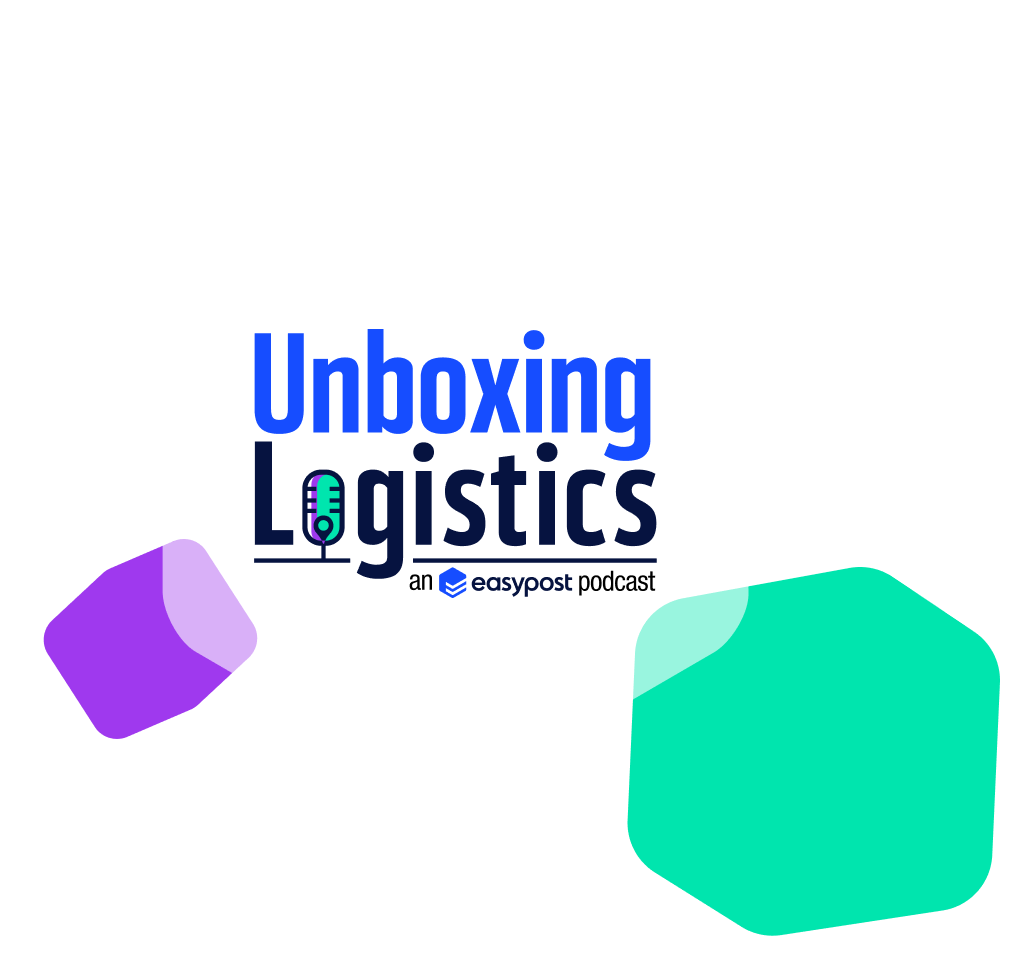Podcast
Unboxing Logistics
This vodcast is for getting to know the fun side of our industry leaders, staying updated with the latest trends, and leveling up your shipping processes. If that sounds like your jam, this is the place for you. Every episode of Unboxing Logistics is stuffed full of insights, innovations, and real-life stories from the people who have been on the front line for years.

Episodes
 Gamifying the Warehouse, With Katie Brown From Foot Locker and Dylan Tilford From Summit Advisory Team - Ep. 62
Gamifying the Warehouse, With Katie Brown From Foot Locker and Dylan Tilford From Summit Advisory Team - Ep. 6240:31
Watch Episode EasyPost Insider: Introducing Forge, a White-Label Shipping Solution, With Brittany Williams From EasyPost - Ep. 61
EasyPost Insider: Introducing Forge, a White-Label Shipping Solution, With Brittany Williams From EasyPost - Ep. 6120:48
Watch Episode Unboxing the Trends April: Carriers in the Spotlight With Tim Ranagan and Lori Boyer From EasyPost - Ep. 60
Unboxing the Trends April: Carriers in the Spotlight With Tim Ranagan and Lori Boyer From EasyPost - Ep. 60 09:24
Watch Episode How Small Retailers Can Win Big With Industry Support With Brandon Gale From Retail Shipping Associates - Ep. 59
How Small Retailers Can Win Big With Industry Support With Brandon Gale From Retail Shipping Associates - Ep. 5940:54
Watch Episode39:43
Watch Episode34:12
Watch Episode Unboxing the Trends February: Tariffs and a New Postmaster General With Lori Boyer and Tim Ranagan From EasyPost - Ep. 56
Unboxing the Trends February: Tariffs and a New Postmaster General With Lori Boyer and Tim Ranagan From EasyPost - Ep. 5610:41
Watch Episode28:45
Watch Episode Costs, Carriers, and China: Parcel Shipping in 2025 With Nate Skiver From LPF Spend Management - Ep. 54
Costs, Carriers, and China: Parcel Shipping in 2025 With Nate Skiver From LPF Spend Management - Ep. 5433:40
Watch Episode13:25
Watch Episode35:50
Watch Episode 2025 Supply Chain Sustainability Trends With Tom Raftery, Sustainability and Technology Evangelist - Ep. 51
2025 Supply Chain Sustainability Trends With Tom Raftery, Sustainability and Technology Evangelist - Ep. 5136:22
Watch Episode33:06
Watch Episode40:02
Watch Episode41:37
Watch Episode35:52
Watch Episode The Power of AI in the Warehouse With Henrik Bergsager and Kushal Pillay From Powerhouse AI - Ep. 46
The Power of AI in the Warehouse With Henrik Bergsager and Kushal Pillay From Powerhouse AI - Ep. 4639:32
Watch Episode40:52
Watch Episode37:16
Watch Episode34:33
Watch Episode Unpacking Customer-Centric Analytics in Logistics With Josh Fredman & Mike Koleno From Better Trucks and Tom Butt From EasyPost - Ep. 42
Unpacking Customer-Centric Analytics in Logistics With Josh Fredman & Mike Koleno From Better Trucks and Tom Butt From EasyPost - Ep. 4233:37
Watch Episode Scaling Logistics to Deliver an Unforgettable Customer Experience With Julian Van Erlach From FabFitFun - Ep. 41
Scaling Logistics to Deliver an Unforgettable Customer Experience With Julian Van Erlach From FabFitFun - Ep. 4137:02
Watch Episode33:12
Watch Episode Going Global: Expanding Your Reach Into International Markets With Ford Deihl From DHL eCommerce - EP. 39
Going Global: Expanding Your Reach Into International Markets With Ford Deihl From DHL eCommerce - EP. 3940:09
Watch Episode40:32
Watch Episode45:33
Watch Episode44:29
Watch Episode22:07
Watch Episode EasyPost Insider: A New Insurance and Claims Experience With Olivia Qin and Brittany Williams From EasyPost - Ep. 34
EasyPost Insider: A New Insurance and Claims Experience With Olivia Qin and Brittany Williams From EasyPost - Ep. 3424:08
Watch Episode The (Flex) Factor: Mastering Flexibility To Get Ahead in Logistics With Jeremy Bodenhamer From ShipHawk - Ep. 33
The (Flex) Factor: Mastering Flexibility To Get Ahead in Logistics With Jeremy Bodenhamer From ShipHawk - Ep. 3340:20
Watch Episode43:02
Watch Episode Automate to Dominate: Essential Steps To Level Up Your Warehouse Operations With Kevin Gaul From RF-SMART - Ep. 31
Automate to Dominate: Essential Steps To Level Up Your Warehouse Operations With Kevin Gaul From RF-SMART - Ep. 3144:04
Watch Episode45:53
Watch Episode44:28
Watch Episode38:09
Watch Episode45:21
Watch Episode40:05
Watch Episode40:55
Watch Episode47:39
Watch Episode33:24
Watch Episode40:53
Watch Episode37:20
Watch Episode46:38
Watch Episode45:57
Watch Episode44:00
Watch Episode46:45
Watch Episode41:45
Watch Episode38:42
Watch Episode EasyPost Enterprise: Navigating High-Volume Shipping Challenges With Jeff Skaistis & Jeff Goeters From EasyPost - Ep. 13
EasyPost Enterprise: Navigating High-Volume Shipping Challenges With Jeff Skaistis & Jeff Goeters From EasyPost - Ep. 1342:14
Watch Episode42:18
Watch Episode49:44
Watch Episode42:02
Watch Episode40:21
Watch Episode42:02
Watch Episode Supply Chain and the Consumer Experience With Matt Boland From Körber and Jill Barron From Summit Advisory Team - Ep. 06
Supply Chain and the Consumer Experience With Matt Boland From Körber and Jill Barron From Summit Advisory Team - Ep. 0646:23
Watch Episode36:50
Watch Episode41:12
Watch Episode39:38
Watch Episode43:25
Watch Episode Challenges and Opportunities of AI in Logistics With James Sutton From Summit Advisory Team / Elevate- Ep. 01
Challenges and Opportunities of AI in Logistics With James Sutton From Summit Advisory Team / Elevate- Ep. 0129:32
Watch Episode









































